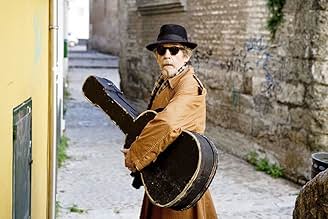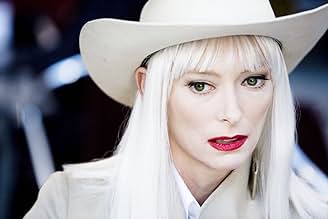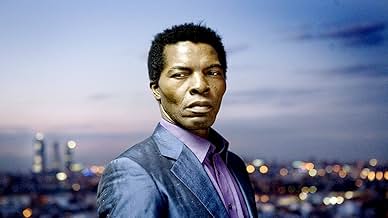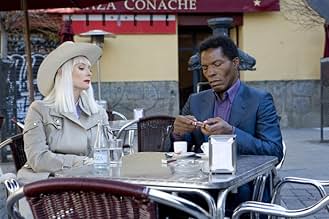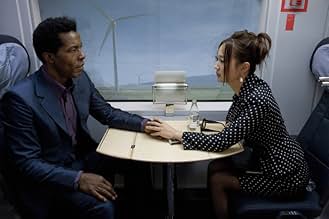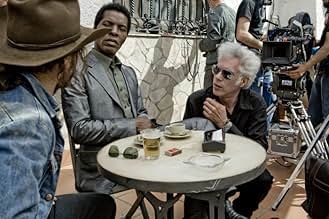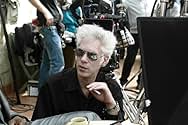La storia di un misterioso tipo solitario, uno sconosciuto in procinto di portare a termine un'azione criminale.La storia di un misterioso tipo solitario, uno sconosciuto in procinto di portare a termine un'azione criminale.La storia di un misterioso tipo solitario, uno sconosciuto in procinto di portare a termine un'azione criminale.
- Premi
- 1 vittoria in totale
- Waiter
- (as Oscar Jaenada)
- Second American
- (as Hector Colomé)
- Flamenco Club Waitress
- (as Maria Isasi)
- Street Kid
- (as Alexander Muñoz Biggie)
Recensioni in evidenza
Film Festivals were invented in the 1930s and 1940s for local tourism & boosterism reasons (Cannes most obviously), became entrenched in the industry in the 1950s and more recently have spun out of control, numbering in the thousands and pretty much used for phony "snob appeal" in posters & trailers, using the familiar Cannes palm logo to surround the names of many idiotic and worthless events. About 25 years ago I came up with a theory that many of the "hottest" international auteurs were locked into the Fest circuit, simply because they had become the darlings of the two dozen or so most-prominent gatekeepers: the festival directors and programmers. Flash forward towards the present day and you can see how Von Trier and Tarantino spring boarded their careers (and critical acceptance, along with devoted fan bases) from key festival exposure. But for every lucky Lars or Quentin there are thousands of indie filmmakers whose movies are CONSUMED on the festival circuit -virtually their entire audience (apart from that bastard offspring, the "home viewer" addicted to Blu-Ray and DVDs) is at these phony events, with little or no subsequent theatrical exposure. Based on my recent study (using 2000 as a sample year), I estimate that roughly 90% of the indie films being made in the past decade or so have failed to find a theatrical distributor.
Back in the '80s it was a familiar group: Wenders, Greenaway, Akerman, Angelopoulos, de Oliveira, Ruiz, Tanner, Kaurismaki (and less so his brother Mika), Jarmusch, several Italians like Amelio, Tornatore and Salvatores (the second wave after Bellocchio & Bertolucci of the '60s), plus up & coming talents from exotic places like Taiwan, Iran and South Korea. What most had in common was a devotion to minimalism: the shot, the lonely landscape was pre-eminent. Film festival directors and cinema buffs are united in their devotion to such minimalist beauty, whether it be evident in the work of now-abandoned Miklos Jancso, or the best of Herzog.
With THE LIMITS OF CONTROL Jarmusch has made a film directly appealing to this film fest sensibility: it answers the pointless question: what new film would Greenaway, Akerman, Raul, Wim & Aki want to see? Such a clubby, insider approach to cinema may be rewarding if one is an amateur navel-gazer with no interest in the audience beyond a small circle of friends -perhaps (I dread) the future of "cinema/video" in a world where You Tube and MySpace are taken seriously. But to my mind this is a dead end, and a career-ending move by someone as talented as Jarmusch.
To a film buff, the obvious starting point for LIMITS OF CONTROL is Jean-Pierre Melville, whose LE SAMOURAI is the unequal-able quintessence of the loner genre. When the protagonist is lying on his bed in a lonely room, Jim fails to achieve the beauty of Melville's color drained cinematography and experimental simultaneous zoom in/dolly out surreal effects, and although Paz is a photogenic bedmate, he doesn't give poor Isaach any memorable motifs comparable to Alain Delon's wonderful pet parakeet in the apartment.
So Jim had Isaach wander around, looking cool in a series of Regis Philbin monochrome suit/shirt combos (casting Regis in the role would have elevated the film immensely for me, just as substituting Al Roker for Bill Murray in the original GROUNDHOG DAY would have made that one brilliant). In the very dull & sycophantic "making of" docu on the DVD Jim is explicit in his rant about the importance of repetition and his foolish claim that nothing is original, all stories have been done already, only variations are possible, but in the final product LIMITS OF CONTROL is way too close to Peter Greenaway's trademark approach to cinema. Copping out doesn't hide this fact. And the philosophical doggerel of his screenplay's dialog is as fatuous as Jim's telling remark in the docu that he is such an expert on music and film history, but what he DOESN'T know is what counts. Jim's apologist fans (the LAST thing he needs!) have already littered IMDb with comments on the zen-like nature of LIMITS, but its endlessly repeated guest star dialog is rather on the level of "Confucius say..." instead.
From an early supporter and fellow Ohioan, I say: it's time to pull your socks up Jim (to paraphrase my favorite Physics professor's Britishism tag line from college). One of my favorite filmmakers in the '60s when I was introduced to Underground Films every Friday & Saturday at midnight showings was George Kuchar, and he has maintained his amateurism for 40 years. I always preferred his funny, cute little story shorts to the bombastic pretentiousness of critical darlings like Michael Snow (see: WAVELENGTH) or Hollis Frampton (ZORN'S LEMMA). Jarmusch's sardonic humor bridges these two extremes of what used to be called the avant garde.
Jim, you've made the big time -you're almost in the pantheon of greats, so don't blow it by listening to the yes-men; you're better than that! Make a film Jean Renoir would be proud of -it's pointless to go down the abstract imagery road of Godfrey Reggio and Ron Fricke.
Instead, just rifle through this list of movies and if you liked any of them, you'll probably like this movie.
"Tetro" (director Francis Ford Coppola, 2009), "Broken Flowers" (director Jim Jarmusch, 2005), "Before It Had a Name" (director Giada Colagrande, 2005), "A Scene at the Sea" (director Takeshi Kitano, 1991), "Der Himmel über Berlin" a.k.a. "Wings of Desire" (director Wim Wenders, 1987), "Paris, Texas" (director Wim Wenders, 1984).
If you haven't heard of, or seen, any of those then just bear in mind that "Limits of Control", like the movies mentioned above, is very slow, almost uneventful, without a lot of revealing dialogue to carry the story. These stories are told in images, and it can be a real challenge keeping up, not because there are a lot of crazy twists and turns, but because there's almost nothing. I could sum up the plot of this movie in 8 words: "a day in the life of a hit-man". But if you're up for a challenge, give it a shot.
As for the soundtrack, I am a fan of some of the artists on it (Boris, Sunn, Earth, etc.), which is part of the reason I wanted to see this film initially. Because these bands can have a very slow, droney sound, I was very interested to see how the mood of the music would work with the tone of the film. I expected the two to compliment each other, but instead, the soundtrack just made everything drag on. Because the film progressed as such a slow pace, I assumed that it was leading up to a grand climax, but the film's culmination barely stood out.
I will say that I admired the film from a technical aspect, and I enjoyed seeing some familiar faces from Jarmusch's earlier work, but I don't think I'll ever watch it again.
The reason I watched this movie was because of Boris & Sunn O)))'s contribution to the soundtrack, and that was the only reason. Well, I was in for it! Personally I don't think this drone / doom metal soundtrack fits this movie, or almost any movie, but surely I am biased. And perhaps I've just listened too much to the songs beforehand so that I find they are too cut down, repetitive and out of place here. Boris's music worked in Kokuhaku, though.
Also, did I get what The Limits of Control was about? Not overall, and I didn't like the unrealistic dialogues. It made the dominating silence in the movie seem more meaningless and less thought-provoking. Still, having random (famous) people ramble on about long-winded, ambiguous and quite irrelevant topics didn't lack charm (I'm not being completely sarcastic, especially in John Hurt's case). But hey, it is a very symbolic and long-dragged movie that shrouds its various points with mystery. It is a full-blown "show, don't tell" piece of film. Make what you will of it; I was entertained throughout but I did not arrive at any satisfactory conclusion.
However, the wavering of the camera in the last second of the movie had me wondering. Did I limit this movie?
Lo sapevi?
- QuizThe Finnish movie, to which Man with Guitar (Sir John Hurt) refers, is Vita da bohème (1992) by Director Aki Kaurismäki, a friend of Writer and Director Jim Jarmusch.
- BlooperWhen the Lone Man travels from Madrid to Sevilla, he enters a S 100 AVE train set. But the interior shots are clearly done in a S 103 (Velaro E), a totally different - and much newer - type of train.
- Citazioni
Blonde: Are you interested in films, by any chance? I like really old films. You can really see what the world looked like, thirty, fifty, a hundred years ago. You know the clothes, the telephones, the trains, the way people smoked cigarettes, the little details of life. The best films are like dreams you're never sure you've really had. I have this image in my head of a room full of sand. And a bird flies towards me, and dips its wing into the sand. And I honestly have no idea whether this image came from a dream, or a film. Sometimes I like it in films when people just sit there, not saying anything.
- Curiosità sui crediti"NO LIMITS NO CONTROL" at the end of the closing credits
- ConnessioniFeatured in The Rotten Tomatoes Show: Watchmen/Shuttle/12 (2009)
- Colonne sonoreFeedbacker
Written & Performed by Boris
Courtesy of Boris
I più visti
Dettagli
- Data di uscita
- Paesi di origine
- Lingue
- Celebre anche come
- No Limits No Control
- Luoghi delle riprese
- Torres Blancas - 37 Avenida de América, Madrid, Spagna(apartment tower)
- Aziende produttrici
- Vedi altri crediti dell’azienda su IMDbPro
Botteghino
- Lordo Stati Uniti e Canada
- 426.688 USD
- Fine settimana di apertura Stati Uniti e Canada
- 55.820 USD
- 3 mag 2009
- Lordo in tutto il mondo
- 1.981.134 USD
- Tempo di esecuzione
- 1h 56min(116 min)
- Colore
- Mix di suoni
- Proporzioni
- 1.85 : 1







